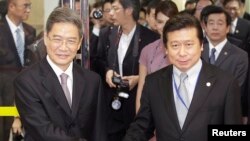Old rivals China and Taiwan held ministerial-level talks Wednesday to shore up relations that were hit by a protest movement earlier this year. China’s top official in charge of Taiwan affairs is visiting the island to scope out its economic and social conditions. It is the first such high-level visit from China.
China’s chief official for Taiwan policy Zhang Zhijun met his counterpart Wang Yu-chi shortly after reaching the island’s main airport Wednesday as scores protested his arrival.
Taiwan says it will announce no new decisions during Zhang’s four-day stay. His agenda includes chats with common Taiwanese and an opposition party figure. Those meetings are seen as ways to show that relations can work, despite protests over a proposed trade pact that opponents worry would boost Beijing’s influence over Taipei.
Strategic studies professor at Tamkang University in Taiwan, Alexander Huang, expects the visit to mark a resumption of dialogue, but without major breakthroughs.
“I think the biggest contribution will be defined as a good start of a regular scheduled Cabinet-level meeting limited to cross-strait relations management, nothing more, nothing less. They will talk about how to manage the future of bilateral dialogue,” he said.
China and Taiwan have been separately ruled since the civil war of the 1940s and Beijing claims sovereignty over the island. In 2008 the two sides broke an icy 60-year impasse with a series of trade, transit and investment deals worked out by semi-official negotiators.
The two ministers, who met in China earlier this year, talked in private Wednesday. They were expected to touch on future trade agreements as well as ways to establish de facto consular offices in Beijing and Taipei. Those offices would support investment and tourism, which have grown briskly on the back of the 21 deals signed since 2008.
In March, thousands of student-led demonstrators accused Taiwan President Ma Ying-jeou of getting too cozy with China without regard to public opinion. Several hundred occupied parliament to stop ratification of a China service trade liberalization pact.
A government survey released in January reported that 36 percent of Taiwanese believe exchanges between the two sides are moving too fast and that 57 percent considered China to be unfriendly.
Taiwan Youth Public Affairs student association southern district head Huang Chun-jung said he would not trust any offers from China following this week’s visit.
He said that whether it was official or semiofficial contact between the two sides, he held few expectations for results. He added that China as an enemy could not be expected to give anything.
The Chinese official is expected to do more listening than talking during his visit. He said Wednesday he faces a task he likened to a boat traveling upstream, but said he hopes for an improvement in mutual political trust.
Analysts predict that to keep relations on track he will likely avoid making comments that could stoke anti-China sentiment. He will meet Taiwan aborigines, a group of low-income people and a figure in the island’s major anti-China opposition party before returning to China on Saturday.







